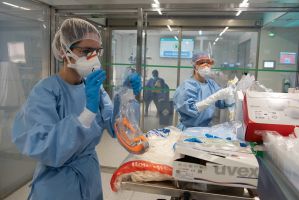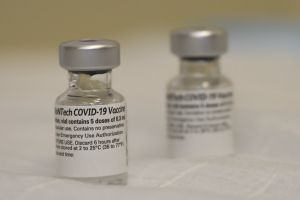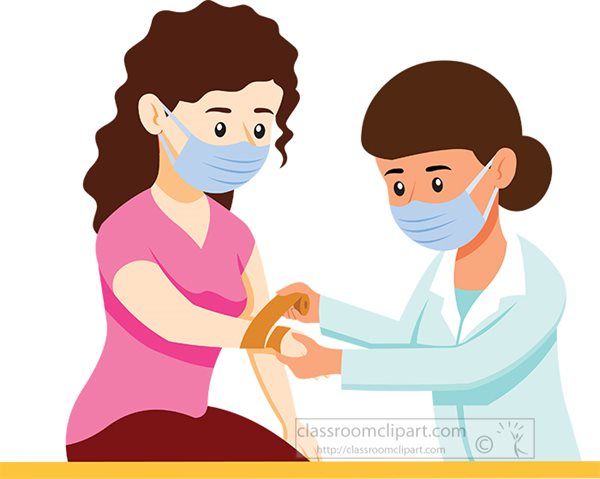For more than a year now, Americans have had to change their normal routines due to the COVID-19 pandemic such as having to wear masks when outside of their homes and maintaining a social distance of at least six feet from one another. Though the everyday American had to make changes to his or her life, the changes that medical professionals have experienced through the pandemic are much more strenuous.
Johanna Church DeSanto, a registered nurse and Cabrini alumna, said that everything changed at her local community hospital starting March 18 of last year.
“Between all the PPE that you would wear when taking care of a patient, it just dawned on me how I would pretty much touch people and get in their face and help them and move them and talk to them,” DeSanto said. “Now I really keep a distance…and I’m wearing a surgical cap and goggles and two masks and a plastic gown.”
DeSanto has been a registered nurse for the past eight years. DeSanto originally graduated from Cabrini with a degree in communication and began to have a career in journalism with her husband shortly after graduating. However, DeSanto had difficulty finding work as a journalist with her husband since most places would not accept both of them to work at the same newspaper, so only one of them would work at a time. Eventually, DeSanto had a career as a real estate agent but left the industry when her children became older.

“Going back to journalism wasn’t really an option. I called myself a dinosaur,” DeSanto said. “Everything had changed and there weren’t really a lot of opportunities.”
DeSanto continued to explain that one day it just came to her that she should become a nurse. She has a lot of friends who are nurses and one day decided to ask one of her friends her opinion about DeSanto becoming a registered nurse. Her friend quickly told DeSanto that she would be a fantastic nurse, even though DeSanto was expecting her friend to tell her that she could not do it. DeSanto later asked her husband for his opinion about her going back to school to become a nurse to which he replied that she has “always been an amateur nurse.” DeSanto graduated from nursing school in 2013 and has been working as a registered nurse ever since.
Prior to the COVID-19 pandemic, DeSanto explained that her work as a nurse was crazy but nothing like how it is now.
“[For] my whole nursing career, I’ve worked overnight shifts,” DeSanto said. “When I get to work, it’s usually pretty crazy. From about maybe three o’clock in the afternoon to about midnight that’s the busiest time for the emergency department.”
DeSanto continues to explain how her nursing days prior to the pandemic were often chaotic at times, but would slowly chip away at the chaos. She helped to admit or discharge patients. She often would see patients with acute issues, heart attacks, stabilize patients with strokes, and help injured people from recreational accidents such as skiing or biking.
Since the start of the pandemic last March, DeSanto has had a lot more concerns to worry about when treating patients and protecting herself and others from the virus.
“Someone would come in and we wouldn’t worry about anything and we would take care of them,” DeSanto said. “Now if I find out 10 minutes later into taking care of you that you had the virus last week, I’m angry…because you didn’t tell me before I had a chance to protect myself. It’s very different.”
DeSanto is one of many medical professionals who are feeling overwhelmed by the effects of the COVID-19 pandemic. According to Anli Yue Zhou and Maria Panagioti, writers for “Occupational Medicine,” many medical professionals have been experiencing higher levels of distress and burnouts, which leads to them having mental health issues.
“Perpetuating factors include the feelings of vulnerability and loss of control, stigmatization, the uncertainty around infection risk and their own health as well as the perception of personal danger due to the high mortality rate that is associated with COVID-19,” Zhou and Panagioti write in their article. “Furthermore, the perception of fear and vulnerability is also likely to be perpetuated by concerns around personal protective equipment.”
The article continues to explain that some of the stress can be alleviated through clear communication and regular updates about the virus. Zhou and Panagioti also mention that doctors are using problem-solving skills as a type of coping mechanism as evident during the outbreak of Severe Acute Respiratory Syndrome (SARS). However, there is still more to learn about COVID-19, which still leaves a lot of stress about the uncertainty of the disease and the pandemic.
The U.S. Food and Drug Administration (FDA) has stated that they are aware that the pandemic is affecting medicine in multiple ways and believe that they have a position to support both medical professionals and patients during this time.
“Although it seems as if we’ve been engaged in the battle against COVID-19 for a very long time, in the broader context of disease and science, it’s actually been a relatively short period,” Stephen M. Hahn, M.D. said. Hahn is a commissioner for the FDA.
Hahn continues to say how the uncertainty of COVID-19 places medical professionals in an uncomfortable position due to their need to be well informed, especially when it concerns the public health and well-being of Americans.
The uncertainty of the virus has led many medical professionals are not only afraid of contracting the virus themselves but are also afraid of potentially spreading it to their family and friends outside of the hospital.
“The hardest part is equal [to] the fear of bringing it home and being incredibly helpless, especially when it first started,” DeSanto said. “Seeing these people come in and knowing they were probably going to die and not being able to help them [and] not having any cures.”
DeSanto further explains that her family was affected by the pandemic just like everyone else such as one of her daughters losing her last semester of her senior year, her other daughter having to change her work and social life around and her mother moving to live with her family. There was the added stress of possibly coming home with the virus and giving it to her family, even after DeSanto received the vaccine.
“At first when I got vaccinated, I felt a tremendous sense of relief that I wasn’t going to bring it home to my family, but then there was the question ‘Could I still bring it home to my family?’” DeSanto said.

DeSanto’s family is now vaccinated, which has caused a sense of relief for DeSanto. She says that the vaccines are helping with slowing down the spread of COVID-19 by reducing the severity of the symptoms of the virus. However, DeSanto believes that even when the pandemic ends that there will be a different kind of normal.
“I think we will be able to do things that we miss…and I feel like in the future we’re going to see if not coronavirus other [related] things that we’re going to be afraid of,” DeSanto said.
Despite the stress and severe changes in her work as a nurse, DeSanto has not changed her view of being a nurse because she does not have a problem taking care of people or putting herself at risk. Though she finds it hard to keep up with the constant changes at her work due to the pandemic, she still wants to take care of people by being a nurse.



